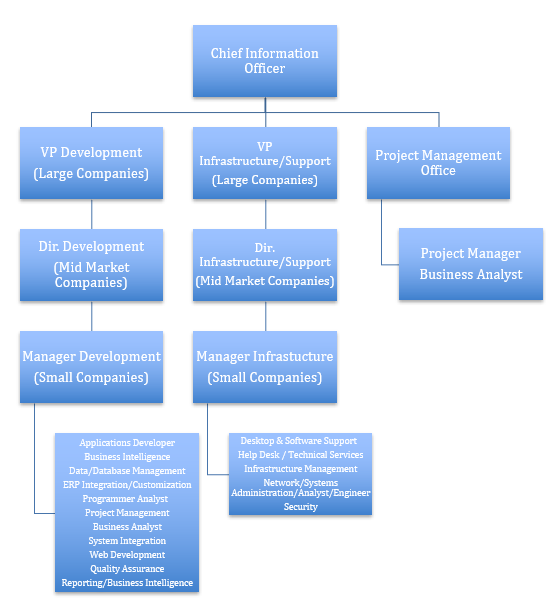
According to this Wall Street Journal article, IT budgets next year are expected to rise at the fastest rate in more than 10 years as businesses invest in technologies that give their organizations greater flexibility. With the investment in these technologies comes the need for talent that can support its implementation. Finding this talent and plugging them into an optimal IT department structure is integral to innovating new products, safeguarding company and consumer data, and ensuring on-demand availability of system resources.
How are most Information Technology Departments Structured?
IT departments are generally broken down are in three major groups:
- Development - This includes App Development, Web Development, Business Intelligence, Reporting, and Database Development
- Infrastructure - This includes anything Hardware related, as well as user support, and security when this function is not segmented into its own function.
- Functional - This includes your Project Managers, Business Analysts, and Technical Writers.
How should corporate and startup companies differ in their approach?
Companies approach the structure of their IT department differently depending on what stage of life their business is in. There is no one ideal IT department structure, as it should be the one that facilitates a company’s growth. And, as the company grows, that structure can change.
For startups, day-to-day IT tasks are often left to whoever has the highest aptitude for that particular issue. Asset protection and IT security are usually outsourced at this level. It used to be that it wasn’t until a company became mid-sized that you would see someone with an IT title. But companies are quickly realizing that this support is key, even at the start-up level.
Larger, more established companies have entire IT departments with various functions and clearly defined roles. The roles support both the IT needs of the company and the customer.
How does the Agile framework impact traditional IT department organizations?
Software development teams leverage agile methodologies, including pair programming, test-driven development, stand-ups, planning sessions, and sprints to encourage collaboration and self-organizing, cross-functional, autonomous teams. This approach is squarely opposed to a more traditional framework. In traditional development, the team takes a clearly defined, linear approach where they methodically analyze, design, develop, and test software.
And while the principles of Agile software development are popular, according to Stacia Norman, Director of IT Recruiting at Orion Talent, it has not found its way into traditional IT departments. “I have found that many companies have accelerated application development using agile methods and standards, but it is still not common to apply agile methods and standards to IT infrastructure and operations. Most organizations focus on stability over speed. Infrastructure services still use a process involving hands-off and delays trying to avoid mishaps,” she explains.
What roles can be outsourced?
Outsourcing IT roles may be a function of a company's life stage or desire to fully staff an IT department. In either case, there are specific IT roles that can be outsourced to skilled professionals:
- Help Desk
- Cybersecurity
- IT infrastructure
- App development
- Network Administrator
- Software Developer
- Software Tester
- Security Analyst
- Systems/Database Engineer
What roles need to be in-house
Tasks associated with automation, as well as those that are consistent and routine are best kept in-house. Alternatively, outsourcing should be considered for specific, highly-skilled, non-routine tasks completed by the roles above.
Find the Right IT Talent
Part of structuring an ideal IT department is staffing it with the right talent. Many employers are finding that they can't find the talent because the best IT candidates never apply online. Or their recruiting process lacks consistency, making it expensive and difficult to uncover the right talent for their complex IT positions. Or possibly their IT budget is increasing due to investment in new technologies, but they can't hire experienced talent fast enough to adapt to it.
Our solution to these hurdles? Consider partnering with an experienced IT Professional Search firm like Orion Talent that knows where to find sought-after talent. Whether you need to hire one CTO or 50 Front End Developers, Orion Talent can fill positions quickly due to our extensive networks of passive candidates.
Archives
- February 2026
- January 2026
- December 2025
- November 2025
- October 2025
- September 2025
- August 2025
- July 2025
- June 2025
- May 2025
- April 2025
- March 2025
- February 2025
- October 2024
- May 2024
- March 2024
- February 2024
- January 2024
- December 2023
- November 2023
- October 2023
- September 2023
- August 2023
- July 2023
- June 2023
- May 2023
- April 2023
- March 2023
- February 2023
- January 2023
- December 2022
- November 2022
- October 2022
- September 2022
- August 2022
- July 2022
- June 2022
- May 2022
- April 2022
- March 2022
- February 2022
- January 2022
- December 2021
- November 2021
- October 2021
- September 2021
- August 2021
- July 2021
- June 2021
- May 2021
- April 2021
- March 2021
- February 2021
- January 2021
- December 2020
- November 2020
- October 2020
- September 2020
- August 2020
- July 2020
- June 2020
- May 2020
- April 2020
- March 2020
- February 2020
- January 2020
- December 2019
- November 2019
- October 2019
- September 2019
- August 2019
- July 2019
- June 2019
- May 2019
- April 2019
- March 2019
- February 2019
- January 2019
- December 2018
- November 2018
- October 2018
- September 2018
- August 2018
- July 2018
- June 2018
- May 2018
- April 2018
- March 2018
- February 2018
- January 2018
- December 2017
- November 2017
- October 2017
- September 2017
- August 2017
- July 2017
- June 2017
- May 2017
- March 2017
- February 2017
- January 2017
 RSS Feed
RSS Feed





















